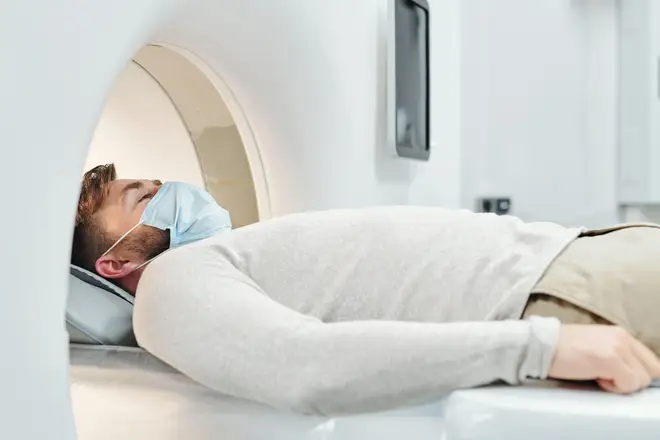
Clive Bull 1am - 4am
29 March 2022, 07:47 | Updated: 29 March 2022, 08:55

Some hospital trusts are asking men if they are pregnant before undergoing scans, it has been reported.
It comes after the Government removed the word "female" from the law governing the medical procedures and replaced it with "individuals".
In 2017, regulations regarding these checks were updated by the Department of Health to be more inclusive – changing those who should be questioned from "females of childbearing age" to "individuals of childbearing potential".
The change was made due to the dangers that radiotherapy, diagnostic imaging and nuclear medicine pose to an unborn child.
Medics must be able to establish whether a patient is pregnant before carrying out the procedures to minimise the risk.
This has led to some hospital trusts asking male cancer patients and those having X-Rays and MRI scans if they could be pregnant, causing uproar among campaigners.
Read more: 'I was out of line': Will Smith apologises to Chris Rock for 'embarrassing' Oscars slap
Read more: Prince Philip's final farewell: Queen hopes to join hundreds at poignant memorial service

Parent of a transgender child talks on gender self-identificationt
"All patients under the age of 60, regardless of how you may identify your gender" are now asked whether they are expecting at The Walton Centre NHS Foundation Trust, in Liverpool, the Telegraph reports.
It is understood to be one of a handful of trusts to have expanded the questioning to male patients despite it not being a national policy at NHS England.
The policy is instead down to individual trusts to decide.
A spokesman for the Walton trust told the Telegraph that its policy "adheres to national legislation, as certain amounts of radiation can be harmful to foetuses in utero".
Read more: Teaching assistant had sex with boy, 15, and told him 'age is just a number'
Campaigners have warned it is the beginning of a "clinically dangerous" move to only record gender, and not sex, on medical records.
Miranda Yardley, trans woman and human rights activist, argues radical trans activists are making people afraid of the entire community.
— LBC (@LBC) March 29, 2022
‘People are becoming afraid of trans people because some of them, to be blunt, are becoming unreasonable’
@NickFerrariLBC pic.twitter.com/zDx1grYFca
Miranda Yardley, a trans woman and human rights activist told Nick Ferrari said this morning: "This is more denial of the reality of biological sex that we saw yesterday, that I saw you eek out of Keir Starmer.
"This isn’t a good idea at all it doesn’t help anybody. Todays latest fashion is being centre instead of the patients actual care."
When asked what the biggest challenge she faces as a trans woman she said when meeting people for the first time, they appear to panic over the right pronouns and fear repercussions for making a mistake.
Adding: "People are becoming afraid of trans people because some [trans people], to be blunt, are becoming unreasonable."
Read more: Starmer grapples with Labour's stance on trans rights and speaks out over 'intolerance'

Sir Keir Starmer hits back at JK Rowling's claims
Kat Barber, of campaign group Sex Not Gender Nurses and Midwives, said: “This is an example of why we need both sex and gender clearly recorded for patients.
"We do not need to ask all patients if they are pregnant. We need to ask females, hence why it is important to know if the person we are providing care for is female whilst also respecting their gender identity," she told the Telegraph.
Campaigners added that those born male cannot get pregnant.
The Society of Radiographers, which published inclusive pregnancy guidance in November last year, said it is important to ask all patients for any possibility of pregnancy.
They have advised medics to ask what sex patients were assigned at birth and then question them on their pregnancy status if they were born female.
They say that the aim is “to move away from the long-standing practice of only enquiring about pregnancy with those that present as female”.